Want to make sure your Facebook ads account isn't shut down? Are you sure you're not violating Facebook's ad policies?
In this article, you'll discover common reasons why Facebook ads accounts are suspended and learn how Facebook's tools can help you better monitor your account's status.
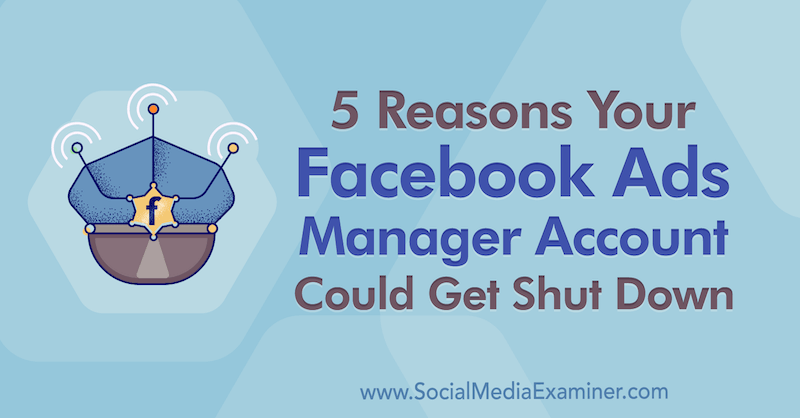
#1: Repeated Declined Payments
If you consistently have payment methods declined for your ad account, Facebook will see this as a red flag and may suspend your account if the pattern continues. Your ad account gets seen as a “bad debtor” and too many late payments or declined bills could put your ad account at risk.
#2: Low Facebook Page Quality
Repeatedly violating community guidelines on your Facebook page can result in a low page quality score, which can put your ability to advertise at risk. Sharing misleading content like fake news or inciting antisocial behavior can make your page look like a troublemaker within the Facebook community and result in your ad account being banned as well.
You can find the full list of Facebook community guidelines here. Note that the community guidelines are different from the ad policies, and advertisers need to understand both.
Review the Standing of Your Facebook Page
To check your Facebook page quality, click the More menu at the top of your page and choose Page Quality from the drop-down menu.
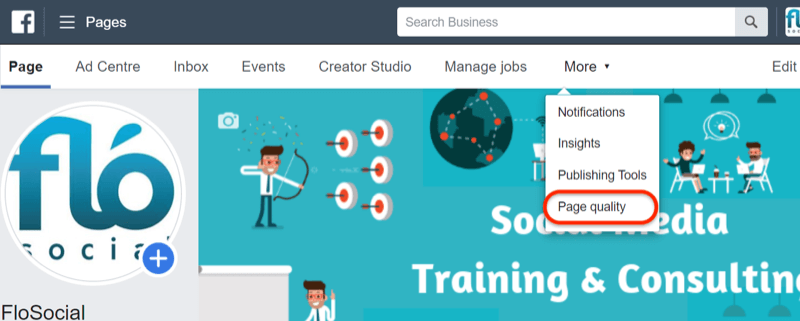
You can then see if your page has been flagged for any quality issues.
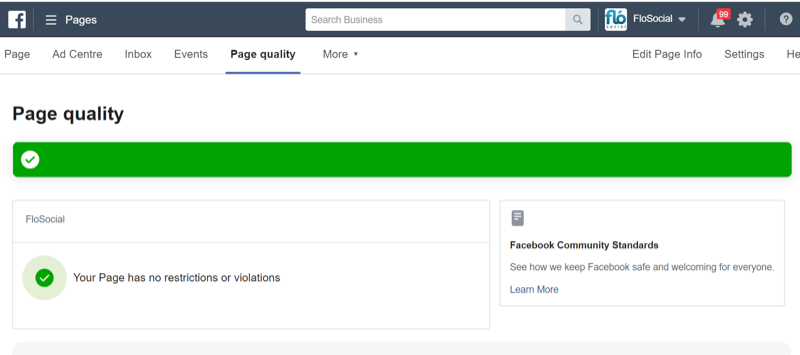
#3: Low Quality Ranking Scores for Facebook and Instagram Ads
Your ads will be scored for their accuracy and relevance for the targeted audience. Ads that get approved but are still considered to be low quality can also lead to your account being banned or taking longer in the future to get your ads approved. Ad quality is affected by things like:
- Using clickbait or engagement bait: Using copy that doesn't show all of the information or baits people to interact will be considered low quality.
- Too much text over an image: Facebook allows ads to run with more than 20% of text over the image, but it considers these ads lower in quality, which can reduce the reach and ad quality score. To see if the proportion of text in your image is too high, use Facebook's Image Text Check tool.
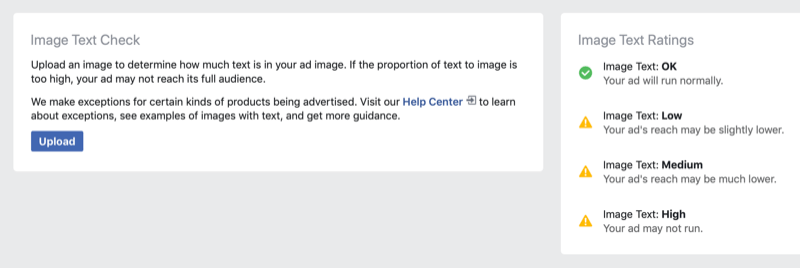
Ads that get hidden or trigger users to Hide All Ads From This Advertiser also will affect your ad quality score.
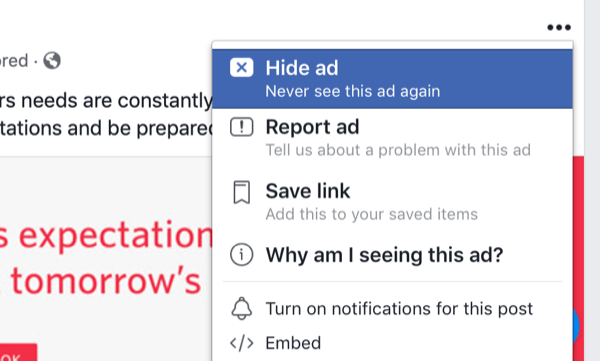
Get World-Class Marketing Training — All Year Long!
Are you facing doubt, uncertainty, or overwhelm? The Social Media Marketing Society can help.
Each month, you’ll receive training from trusted marketing experts, covering everything from AI to organic social marketing. When you join, you’ll also get immediate access to:
- A library of 100+ marketing trainings
- A community of like-minded marketers
- Monthly online community meetups
- Relevant news and trends updates
Review the Quality Ranking of Your Ads
You can check your ads' quality score in the Ads section of Facebook Ads Manager. The quality ranking score is one of three metrics that replaced the relevance score.
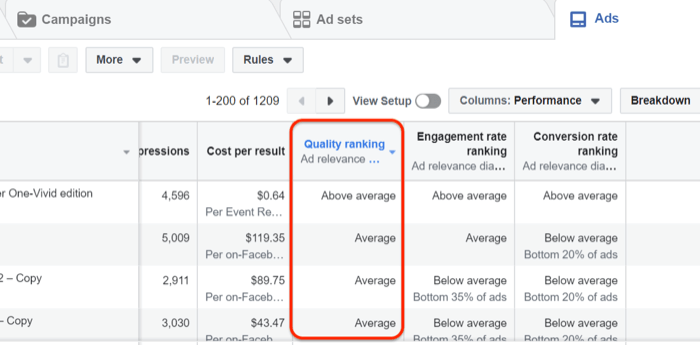
#4: Poor-Quality Landing Page
Facebook screens any links to websites or downloads to ensure they follow the same set of ad rules. Facebook will scan your landing page and apply their same screening tools to it. A low-quality experience on a landing page includes:
- Too many pop-ups or distractions
- Not enough information or a higher volume of advertising
- Content that's misleading or not relevant to the ad
- Lack of functionality—broken links, low-quality images, videos that don't play, and so on
Review Your Landing Page With the Facebook Link Debugging Tool
Facebook's Sharing Debugger allows you to see what information Facebook is pulling through from your link or landing page. If you have a landing page that looks like it should be compliant with Facebook's policies but still gets disapproved when used with your ad, use the debugging tool to make sure the information being pulled through is correct and no flagged terms or policy violations are hiding in the page description or metadata.
This process will also force Facebook to clear their cached version of your content if you've made changes to align your landing page with Facebook's ad policies.
To use this tool, go to https://developers.facebook.com/tools/debug and paste your URL into the search box. Then click Debug.
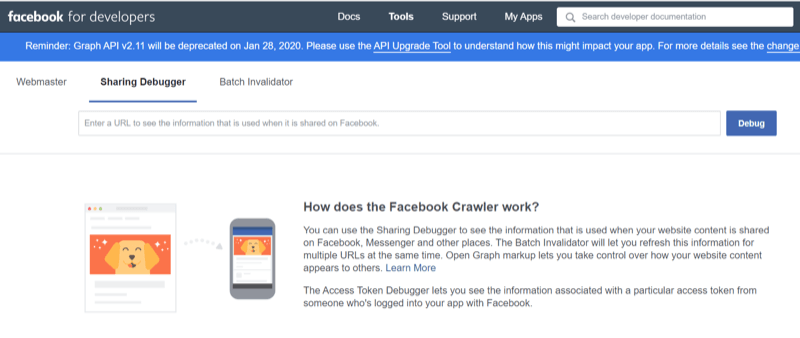
If the URL is new, you'll need to click Fetch New Information to ask Facebook to go and fetch the URL and populate the information for you.
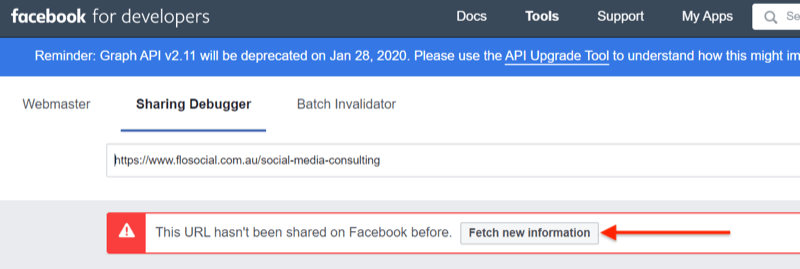
Facebook will then populate the information.
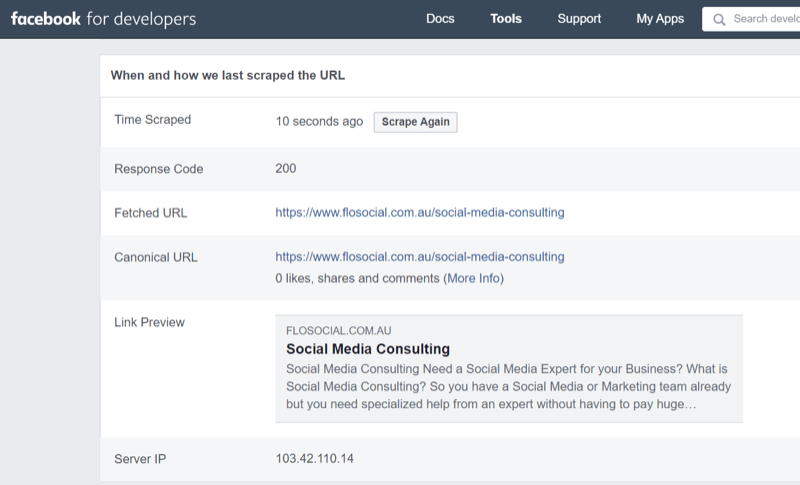
Suppose you had a landing page for a weight-loss product that violated Facebook's policies by using terms not allowed so you updated the landing page to remove these terms. You can use the debugging tool to check the information Facebook is now reading about that page. Double-check that you've updated all of the terms and that Facebook will now allow the landing page to be used.
#5: Repeated Facebook Ads Policy Violations
All advertisers get flagged for an ad breaking policy every now and again but if you consistently break the rules and have your ads disapproved, you run the risk of having your Facebook ad account shut down. If you can't play by the rules, Facebook will simply kick you out of the sandbox.
Review Facebook Ads Policy Violations via the Account Quality Tool
Facebook now allows you to review your previously disapproved ads to see which policies you've broken and why your ads weren't approved. You can also check the history of your ad account and monitor any ads that are under review or appeal.
To do this, open Facebook Business Manager and select Account Quality in the Create & Manage section.
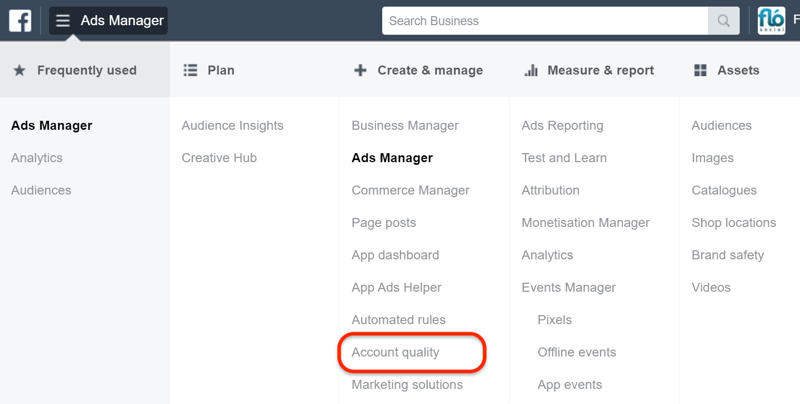
On the next page, choose the date range you want to review from the calendar at the top right.
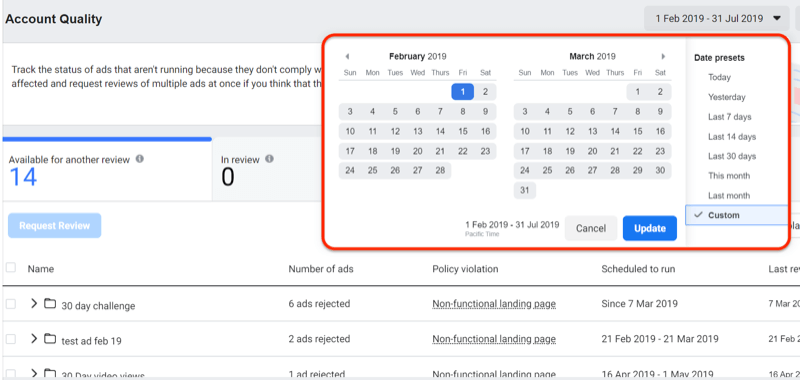
Facebook will show each ad that's been flagged or disapproved. You can also see exactly which policy those ads violated.
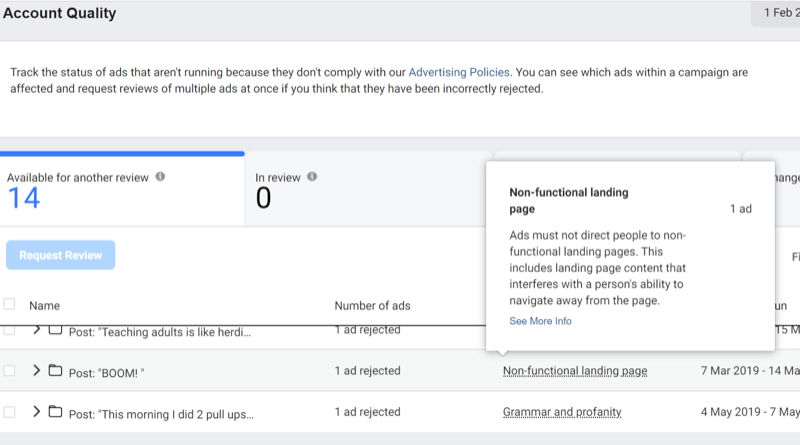
If you want to request that multiple ads be reviewed again, select the checkboxes next to each of those ads and then click Request Review.
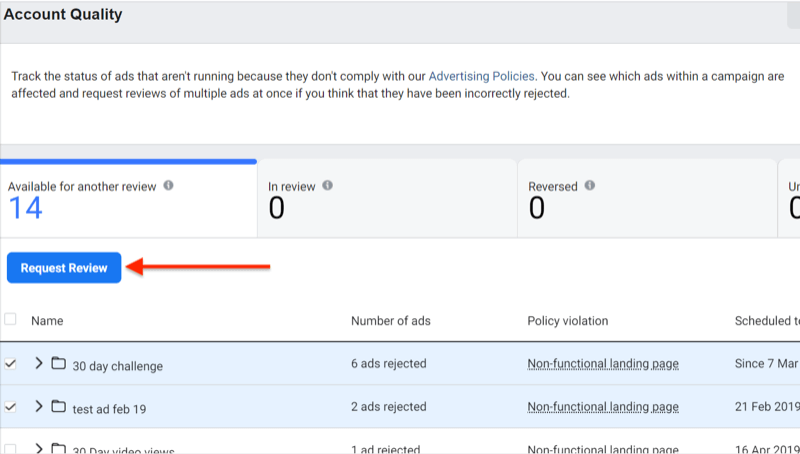

Discover Proven Marketing Strategies and Tips
Want to go even deeper with your marketing? Check out the Social Media Marketing Podcast! Publishing weekly since 2012, the Social Media Marketing Podcast helps you navigate the constantly changing marketing jungle, with expert interviews from marketing pros.
But don’t let the name fool you. This show is about a lot more than just social media marketing. With over 600 episodes and millions of downloads each year, this show has been a trusted source for marketers for well over a decade.
Facebook Ad Creative Practices to Avoid
All promoted content on Facebook and Instagram undergoes a review before going live to ensure it complies with Facebook's ad policies. The review process usually takes 2–10 minutes on average but times can increase to as much as 48 hours during busy periods or for ads within certain categories that receive higher scrutiny such as political, finance, and housing ads.
Ads first pass through Facebook's AI tools for screening; they're not initially screened by an actual moderator. Facebook's AI is highly sophisticated at understanding the content and context of ads and will screen the elements of each ad. Your copy is screened for any flagged words like cursing, adult content, and terms that violate Facebook's ad policies.
The AI can also understand the content of an image including how many people are featured, how much of the image shows a person, and the nature of what the image contains. It can even tell if the image contains too much skin, shows upsetting scenes, or includes anything that breaks the community guidelines.
When you're building out your Facebook and Instagram ads, it's easy to think you've done everything right but then get disapproved after review. If your ad is disapproved, Facebook will notify you by email or you'll see the word “Rejected” next to the ad within your ad account.
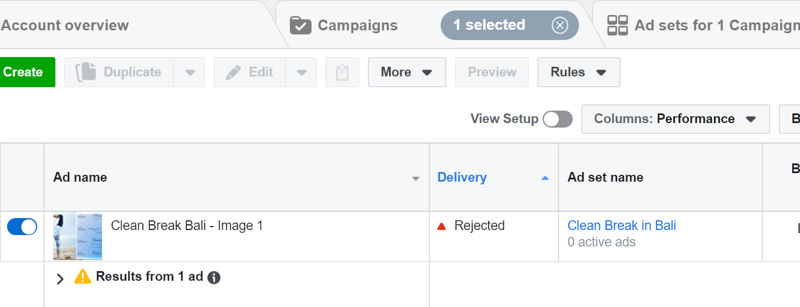
You can appeal the decision and ask that it be reviewed by a person, not just judged by Facebook's AI. Check the policy you violated and then request a manual review. Include details about why you think the ad complied with the policy.
There are ways to avoid having future ads disapproved. Here are the most common mistakes that advertisers make when setting up Facebook ads and how to fix them.
References to Personal Attributes
Facebook wants everyone to have a great time using the platform and safeguards the user experience with tough rules for what advertisers can and can't say. The Personal Attributes rule is the most common example of this protective nature that can be tough for advertisers to understand.
Facebook doesn't allow advertisers to refer to anyone in an ad by their personal characteristic so it disallows the use of phrases like ” Do you…” or “Are you…” followed by a personal characteristic. Even if your ad and copy are positive, Facebook still won't allow you to identify a person by their characteristic. The Facebook policy states:
“Ads must not contain content that asserts or implies personal attributes. This includes direct or indirect assertions or implications about a person's race, ethnic origin, religion, beliefs, age, sexual orientation or practices, gender identity, disability, medical condition (including physical or mental health), financial status, membership in a trade union, criminal record or name.”
Getting clever with your copywriting is the only way to get around this type of rule. It may be helpful to use Facebook's Ad Library for copy inspiration from your competitors or similar industries that have approved ads running.
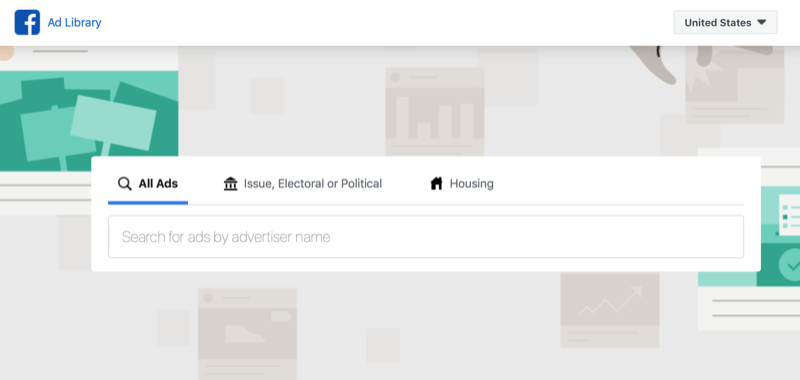
Restricted Keywords and Content
Facebook's ad policies are extensive and all ads are screened to ensure they don't break the rules. Even a well-written, clean-looking ad for vaping won't be allowed because Facebook doesn't support the sale of tobacco products.
Facebook screens ads for certain words and phrases that break policy and will often disapprove ads that contain them, even if the ad doesn't actually break any ad policies. Terms like “fat loss,” “lose weight,” “mortgages,” “payday loans,” “income,” and “weed” are often flagged and cause an ad to be disapproved even if the ad is acceptable.
To avoid your ad being flagged, check your ad copy to be sure it doesn't violate ad policies. Then request a manual review and detail why you believe the ad is compliant. Your ad will then be screened by a Facebook moderator. If approved, it will start to run. If not, you'll receive feedback on which policy the ad breaks.
Before-and-After Images
You can post “before-and-after” images side by side or in a collage on your Facebook page or Instagram profile with no issues. However, when you go to promote or sponsor that content, you'll come up against Facebook's ad rule 19 under the Personal Health guidelines:
“Ads must not contain ‘before-and-after' images or images that contain unexpected or unlikely results. Ad content must not imply or attempt to generate negative self-perception in order to promote diet, weight loss or other health-related products.”
Images With Close-Ups of Body Parts
This rule also falls under the personal health policy. Any ads that show close-ups of body parts aren't allowed, even if the context is innocent. Examples include close-ups of an earring in someone's ear or a doctor lecturing students with a close-up of a body part in the background.
To avoid being flagged for this issue, choose your images carefully and shoot any content for social media with this rule in mind.
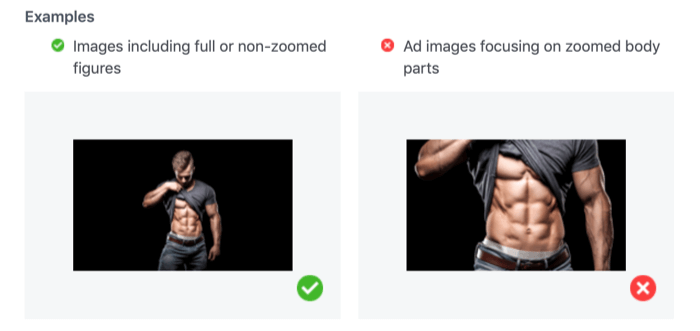
Copyrighted Music or Video
You must have the rights to use a piece of music with your video content or Facebook will mute or partially mute sections of your video in which the music is playing. Any music used in a video or playing in the background of a video will be screened and checked against the copyright database.
Conclusion
If your client's or your own account is often getting ads disapproved without good reason, you may have ended up on Facebook's “naughty” list. That means you're now undergoing more scrutiny than others due to previous mistakes.
Fortunately, Facebook has tools that allow you to see where the issue lies and why you've been flagged for policy violations so you can avoid them in the future.
Facebook is simply protecting the user experience and asking that businesses play by the rules and provide good-quality, relevant experiences when advertising. Although frustrating at times, the ad policies are designed to help protect everyone including advertisers.
Make sure you're familiar with the ad policies that affect your industry, check out the common pitfalls and policy violations you could stumble into, and have a plan in place to avoid them. Use Facebook's Ad Library or creative inspiration tools to get ideas for how to run successful, easily approved ads.
If your Facebook advertising account has been suspended or shut down, watch this video to learn how to submit an appeal for reinstatement to Facebook.
What do you think? Will you make any changes to how you manage your Facebook ads account? Share your thoughts in the comments below.
More articles on Facebook ads:
- Find out how to recover a suspended Facebook ads account.
- Learn how to improve your Facebook ads with customer research.
- Discover how to write Facebook ad copy that improves your conversions.
Attention Agency Owners, Brand Marketers, and Consultants

Introducing the Marketing Agency Show–our newest podcast designed to explore the struggles of agency marketers.
Join show host and agency owner, Brooke Sellas, as she interviews agency marketers and digs deep into their biggest challenges. Explore topics like navigating rough economic times, leveraging AI, service diversification, client acquisition, and much more.
Just pull up your favorite podcast app, search for Marketing Agency Show and start listening. Or click the button below for more information.

